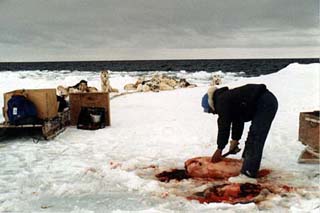Table of Contents
Featured Inuit Dog Owner: Dr. Lucien Ockovsky
The First Official ISDI Gathering
Nunavut Quest 2001 Diary
The Song of the Glacier
An Arctic "Fish Story"
Defining ISD Purity
Distemper in the North
Brucellosis in Arctic Marine Mammals: A threat to team dogs?
Poem: But, I must be dreaming, that's years ago...
Book Review: the latest Coppinger book
Janice Howls: Who Belongs in the ISDI?
Page from a Behaviour Notebook: Inuit Dog Stereotypes
Frankly Speaking: Zombies
Navigating This
Site
Index of articles by subject
Index
of back issues by volume number
Search The
Fan Hitch
Articles
to download and print
Ordering
Ken MacRury's Thesis
Our
comprehensive list of resources
Talk
to The Fan
Hitch
The Fan Hitch
home page
ISDI
home page
Editor: Sue Hamilton
Webmaster: Mark Hamilton
Contents of The Fan Hitch Website and its publications are protected by international copyright laws. No photo, drawing or text may be reproduced in any form without written consent. Webmasters please note: written consent is necessary before linking this site to yours! Please forward requests to Sue Hamilton, 55 Town Line Rd., Harwinton, Connecticut 06791, USA or mail@thefanhitch.org

Butchering a seal at the floe edge Hamilton photo
Brucellosis in Arctic Marine
Mammals:
A threat to team dogs?
by Sue Hamilton
The story first appeared in the August 8, 2001 edition of the Canadian Broadcasting Corporation's "News North". The Canadian Department of Fisheries and Oceans has identified nine cases of brucellosis in ring and harp seals and one in a beluga whale, from Hudson Bay to the western high arctic. It is suspected that walrus and narwhal are also affected. Until now, the disease in wildlife has been identified only in caribou. According to the report, brucellosis in caribou has been transmitted to humans, causing fever, headache and flu-like symptoms.
Although the brucellosis bacterium has many strains that affect different animal species, including cattle, what the article seems to be indicating is that there appears to be interspecies infectivity.
The Canadian government is investigating whether or not the disease in marine mammals can be transmitted to humans, even though they have already declared its presence in marine mammals a “legitimate problem”.
The only way to get a handle on the prevalence of the disease is by the widespread blood testing of various species, including humans and dogs. Because of the recent findings in marine mammals, it is understandable why the Canadian government plans to test humans. There has been no mention of performing the relatively simple test on dogs. Wary dog breeders in the States have for years required that both stud dogs and brood bitches be tested for the presence of canine brucellosis prior to mating. In dogs, the disease can cause sterility in males and abortions and still births in pregnant females. No vaccine exists for either humans or dogs. According to the 1980 veterinary text: Current Veterinary Therapy (Ricardo, Carmichael "Canine Brucellosis" pp. 1303-1305), treatment is "expensive, impractical and not necessarily effective." There may be a persistent but unapparent communicable infection lasting for years after obvious infection. Although dogs may recover from the disease, resulting in immunity, infertility may be lifelong. While canine brucellosis is considered a public health risk, people “should not be alarmed since man, like other non-canine species, appears to be relatively resistant.”
The Fan Hitch will seek to gather more information about brucellosis in the arctic, if and how it impacts dogs now and what the future may bring, and present more information in the next issue.
References
Ricardo, F-C., & Carmichael, L. E. (1980). Current Veterinary Therapy. (Vol. 7) Mexico City and Ithaca, NY: (ISBN 0-7216-5471-1) W. B. Saunders Company.